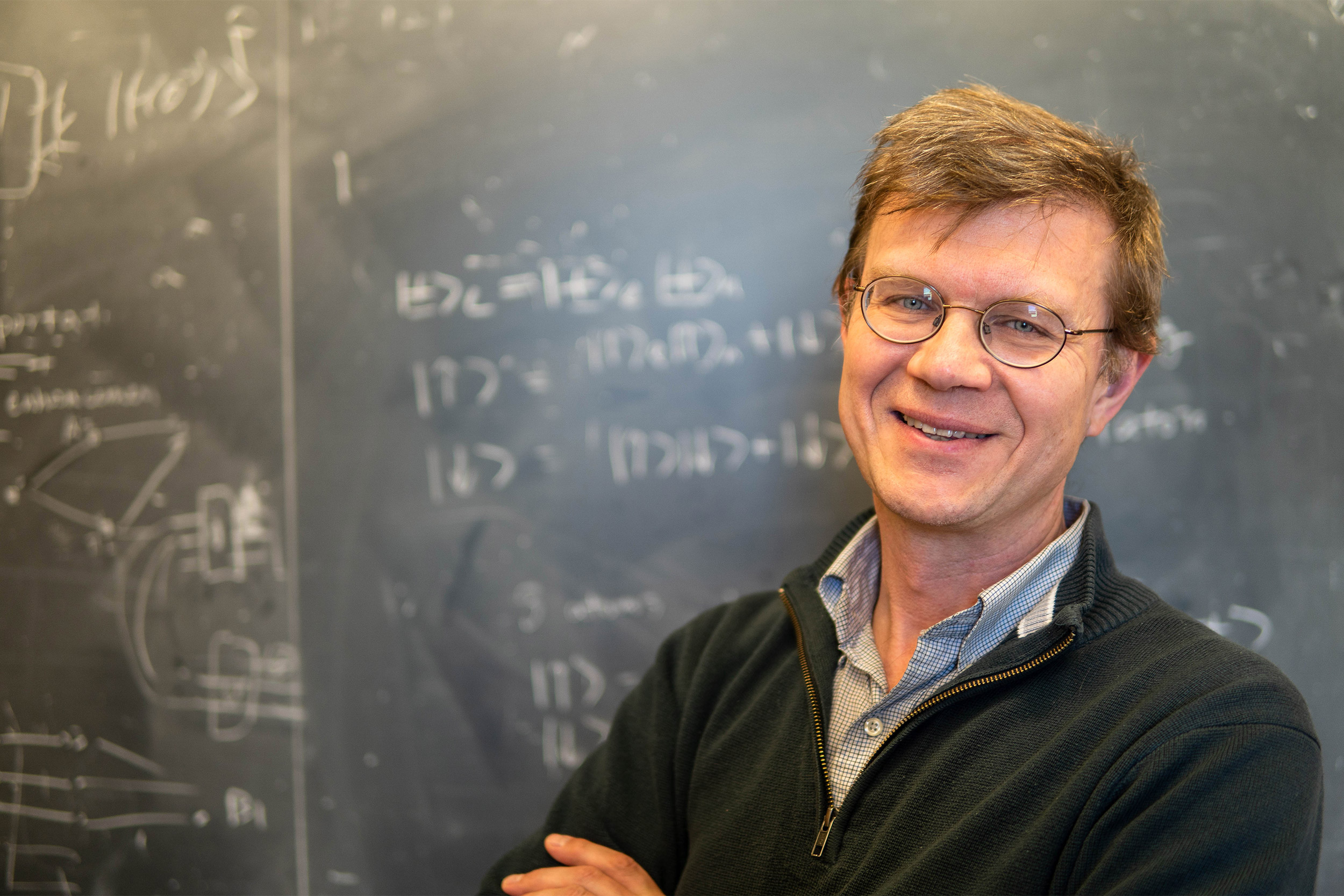
As a University Professor, Mikhail Lukin is now among 25 Harvard faculty members who currently hold this honor.
File photo by Sophie Park
Mikhail Lukin named University Professor
Physicist will hold the Friedman University Professorship
Mikhail Lukin, a pioneer and leader in quantum science and quantum computing, has been named a University Professor, Harvard’s highest honor for faculty.
Beginning July 1, Lukin will hold the University Professorship established by Joshua Friedman ’76, M.B.A. ’80, J.D. ’82, and Beth Friedman in 2017. The chair supports a tenured faculty member who has shown both extraordinary academic accomplishment and leadership within the University community.
“A pioneer in applying quantum optics for quantum computing purposes, Professor Lukin is central to the University’s ambitions in quantum science and engineering,” Harvard President Larry Bacow said. “As co-director of both the Harvard-MIT Center for Ultracold Atoms and the Harvard Quantum Initiative in Science and Engineering, he produces work that is not only elegant and beautiful, but also enormously promising in its capacity to create innovations that are likely to change many of our lives. It is a pleasure to welcome one of the best quantum information scientists in the world into the ranks of the University Professor.”
Lukin’s work in quantum science and engineering aims to use quantum superposition and quantum entanglement — the fundamental phenomena governing the interactions between photons, atoms, molecules, and electrons — to create new devices and applications, including quantum computers.
Classical computers, such as smartphones and laptops, depend on binary bits of data denoted as 1’s and 0’s. Quantum computers use quantum bits, or qubits. Due to quantum superposition, which is the ability of something at the quantum level to be in multiple states at one time, qubits can be 1’s, 0’s, or both simultaneously. Because of qubits’ properties, quantum computers can solve highly complex computations in a few hundred minutes that would take a classical computer more than 10,000 years.
“A pioneer in applying quantum optics for quantum computing purposes, Professor Lukin is central to the University’s ambitions in quantum science and engineering.”
Larry Bacow, Harvard president
According to Lukin, quantum computing has a potential to transform science and society, and the current era is akin to the early days of transistors and conventional computers, with many exciting opportunities that cut across physics, chemistry, biology, engineering, and computer science.
“Quantum is a unique field, truly interdisciplinary, originating from physics, chemistry, and mathematics, with implications to philosophy, and more recently connections to engineering, computer science, business, global security, and public policy. At Harvard we have a truly extraordinary community that includes an exceptional group of students, postdocs, and faculty that closely collaborate across many departments and Schools, making it a very special place to do this work,” said Lukin, who is currently the George Vasmer Leverett Professor of Physics. “This group’s collaborative efforts have already transformed the cutting-edge frontier in this field, and with this professorship, I hope to be able to help elevate this work even further by bringing together scientists and engineers to explore new scientific directions, make new discoveries, and realize applications that address the biggest challenges facing the world.”
Lukin grew up in Russia at the end of the Cold War. He has said that those formative years were an unusual time that was extremely challenging, but he was fortunate to be taught by dedicated individuals who piqued his interest in physics and solving scientific problems while he earned his master’s degree from the Moscow Institute of Physics and Technology.
When he arrived in the early 1990s at Texas A&M University in College Station, where he received his doctorate, and later when he came to Harvard’s Institute for Theoretical Atomic and Molecular Physics as a postdoc, Lukin said that he was very lucky to work with a remarkable group of mentors and peers who took him seriously as a researcher, but also helped him to mature and develop both as a scientist and a member of his community.
Inspired by the influence of his mentors, Lukin has advised or sponsored more than 150 graduate students and postdoctoral fellows. He has also published more than 450 papers and has received several of the top awards in his field, including the I.I. Rabi Prize of American Physical Society (2009), the Willis E. Lamb Award for Quantum Optics and Laser Science (2017), the Charles Hard Townes Award of the Optical Society of America (2021), and the Norman F. Ramsey Prize of American Physical Society (2022).
The first University Professorships were created in 1935 as a means to recognize “individuals of distinction … working on the frontiers of knowledge, and in such a way as to cross the conventional boundaries of the specialties.” With the addition of Lukin, 25 Harvard faculty members across the University currently hold this honor.




